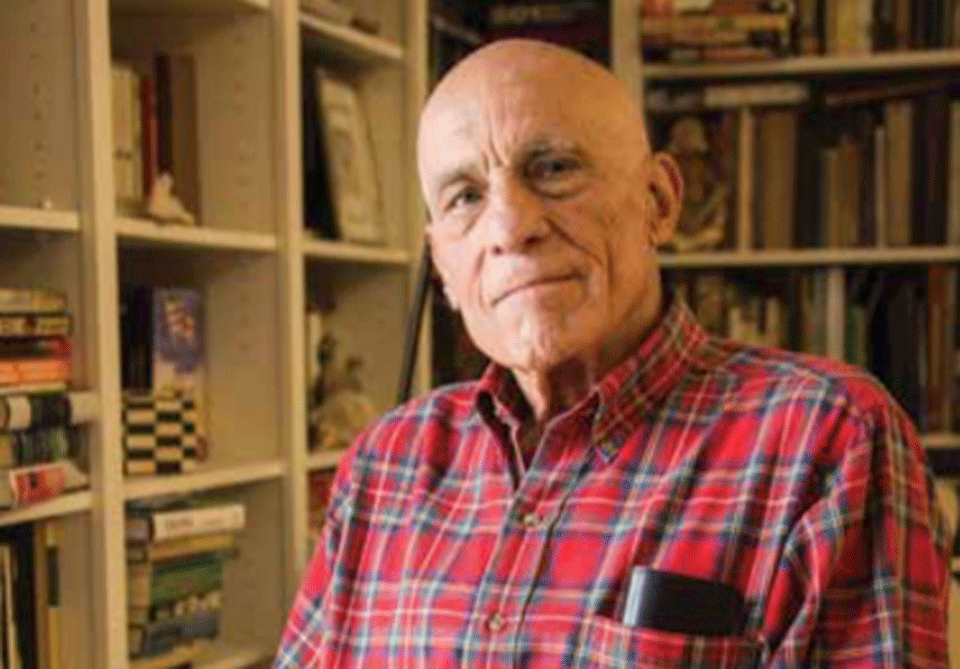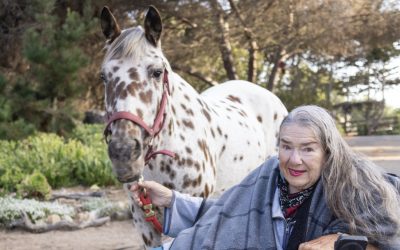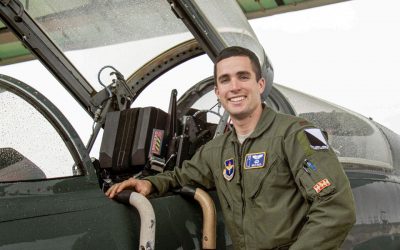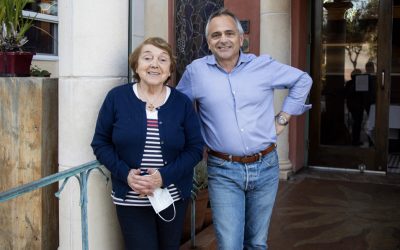“Of course, I’m an idealist,” he said
SOME BELIEVE THAT CHANGE IS INEVITABLE. Others chart a course hoping they’ll be followed. At 78 years on the planet, Louis (Lou) Tornatzky, has just tried to be in the right place at the right time At least that’s the impression he conveys with a curriculum vitae focused on bridging the disciplines at colleges across the Midwest and Southern states and getting creative technology implemented where it can do the most good.
Though happily settled in Los Osos since 2005 with his wife Lynette Tornatzky-herself known locally for authoring the Los Osos/ Baywood Park history book in the Images of America series-with an eye towards permanent retirement he keeps looking for projects and organizations that might welcome being “shook up.”
After retiring from Cal Poly as a Department Chair and Co-director/founder of the University’s Center for Innovation and Entrepreneurship in 2013, he made a choice that surprised some friends who’d known him for over 30 years. He ran for public office. To win a seat on the Los Osos Community Services District Board he employed a tactic that used to be old hat among local politicians but had gone out of vogue in the era of social media. He went on a walking tour of the small town that’s officially run by the County. In addition to leafleting and door-hangers, he racked up about 300 face-to-face “chats” with residents, which he credits for giving him an edge in the field of seven.
As the term comes to an end in December 2018, the CSD’s major objective of getting a waste water treatment facility up and run- ning has been achieved, but Lou’s not so sure his PhD in social-organizational psychology came in as handily as he’d expected.” Change is hard, I’ve twisted the arm of the dominant culture wherever I’ve been,” he said. “Many people have been happy to come along for the ride.”
When asked if he would be interested in having a local journalist write up a profile about his experiences, he later admitted he had already been in a period of reflection, having recently found a box of mementos and letters packed away for nearly six decades.
While able to detail the vagaries of intellectual property law and their use, or sometimes lack thereof, in the academic realm, and shifting over the personal details of two previous marriages and family dynamics, the events he focuses on as being the most formative were in the first 20 years of his adult life.
Included in his treasure trove was a commemorative postcard from a trip across the international dateline whilst serving in the United States Marine Corps, which is where he usually starts his story. On his 18th birthday, he headed down to the recruitment center with a friend in tow.
After retiring from Cal Poly as a Department Chair and Co-director/founder of the University’s Center for Innovation and Entrepreneurship in 2013, he made a choice that surprised some friends who’d known him for over 30 years. He ran for public office. To win a seat on the Los Osos Community Services District Board he employed a tactic that used to be old hat among local politicians but had gone out of vogue in the era of social media. He went on a walking tour of the small town that’s officially run by the County. In addition to leafleting and door-hangers, he racked up about 300 face-to-face “chats” with residents, which he credits for giving him an edge in the field of seven.
As the term comes to an end in December 2018, the CSD’s major objective of getting a waste water treatment facility up and run- ning has been achieved, but Lou’s not so sure his PhD in social-organizational psychology came in as handily as he’d expected.” Change is hard, I’ve twisted the arm of the dominant culture wherever I’ve been,” he said. “Many people have been happy to come along for the ride.”
When asked if he would be interested in having a local journalist write up a profile about his experiences, he later admitted he had already been in a period of reflection, having recently found a box of mementos and letters packed away for nearly six decades.
While able to detail the vagaries of intellectual property law and their use, or sometimes lack thereof, in the academic realm, and shifting over the personal details of two previous marriages and family dynamics, the events he focuses on as being the most formative were in the first 20 years of his adult life.
Included in his treasure trove was a commemorative postcard from a trip across the international dateline whilst serving in the United States Marine Corps, which is where he usually starts his story. On his 18th birthday, he headed down to the recruitment center with a friend in tow.
“I was in the Marines for three years, two months, 21 days,” he said, with practiced precision, noting that his service, and 14 months stationed in Japan, took place in the window between the con icts in Korea and Vietnam.
“Lou has always been out of the box and rebellious,” Onaga explained. “Folks like that face people wanting to shut them down, to maintain the status quo. But he says what he thinks and that’s led to an interesting life.”
“That group of us from grad school has always stuck together,” added Mitch Fleischer, another student who later rejoined Lou in efforts to reinvigorate a stalling Detroit automotive sector in the 1980s. “I think the reason that period is so important to him and us was that was a time where we were all working together using what we found to systematically improve society. Much of that later work was about finding funds, but the early days were about acting on that fantasy you have.”
Lou had already lived a packed decade before going to work at Michigan State.
“More than anything I’m a history buff,” he said, after sliding a yellowed piece of newsprint across the table, “You may have heard of something called the House Un-American Activities Committee.
“When I came back after the Marines for my bachelor’s degree at Ohio State I was 21, and older than my peers, but I had some technical training credits, which helped me graduate in three years. Ohio is much better now, but at the time suppression of free speech was common.”
The saying goes, “If you can remember the 1960s you weren’t there,” but having notes helps.
“That group of us from grad school has always stuck together,” added Mitch Fleischer, another student who later rejoined Lou in efforts to reinvigorate a stalling Detroit automotive sector in the 1980s. “I think the reason that period is so important to him and us was that was a time where we were all working together using what we found to systematically improve society. Much of that later work was about finding funds, but the early days were about acting on that fantasy you have.”
Lou had already lived a packed decade before going to work at Michigan State.
“More than anything I’m a history buff,” he said, after sliding a yellowed piece of newsprint across the table, “You may have heard of something called the House Un-American Activities Committee.
“When I came back after the Marines for my bachelor’s degree at Ohio State I was 21, and older than my peers, but I had some technical training credits, which helped me graduate in three years. Ohio is much better now, but at the time suppression of free speech was common.”
The saying goes, “If you can remember the 1960s you weren’t there,” but having notes helps.
“It’s a crazy thought, but it’s a Marine’s thought process,” he said. “that when the war started three years after my discharge, I was married and a father, and I wasn’t there with them.”
That kind of loyalty comes up in conversation with Lou’s former colleagues and students, of which Esther Onaga, is both. Recently retired from a long career in the Michigan State University system, she got her start as a grad-student with him, and far from feeling abandoned, she said, the feeling among program participants, that Lou always had their back, welcomed diversity (both in people and ideas), and empowered students (even in conflict with their own administration) garnered him equal loyalty.
“I had no idea what it was going to be like, what to expect,” she said. “The two of them together (Lou and program founder Bill Fairweather) were the most unorthodox pair. In Hawaii my background was very traditional training in teacher’s ed and here they were using a college (psychology) department to address world poverty, racism, environmental degradation, and overpopulation- in one department.”
Just the idea of crossing so many disciplines (using the newly minted term “ecological psychology”) broke ground, she said, but breaking ground wasn’t always welcome outside their cohort, despite being some of her professor’s most valuable qualities.
That kind of loyalty comes up in conversation with Lou’s former colleagues and students, of which Esther Onaga, is both. Recently retired from a long career in the Michigan State University system, she got her start as a grad-student with him, and far from feeling abandoned, she said, the feeling among program participants, that Lou always had their back, welcomed diversity (both in people and ideas), and empowered students (even in conflict with their own administration) garnered him equal loyalty.
“I had no idea what it was going to be like, what to expect,” she said. “The two of them together (Lou and program founder Bill Fairweather) were the most unorthodox pair. In Hawaii my background was very traditional training in teacher’s ed and here they were using a college (psychology) department to address world poverty, racism, environmental degradation, and overpopulation- in one department.”
Just the idea of crossing so many disciplines (using the newly minted term “ecological psychology”) broke ground, she said, but breaking ground wasn’t always welcome outside their cohort, despite being some of her professor’s most valuable qualities.
As he laid out years later in letters for friends and family, in 1962, the Com- mittee, also known as HUAC, was still a staple of anti-Communist paranoia although no longer as powerful as in the McCarthy era. A speaker known for advocating the dissolution of HUAC was invited to campus by the Students for Liberal Action and when university administration got wind
of it they locked the venue. When attendees congregated elsewhere, including Lou and a date, they were pelted with eggs and tomatoes. Aside from writing a “fire-breathing” letter on the event, which was distributed through the campus paper, he joined a lawsuit against the school.
“For the rest of my time at OSU the Court and the lawyers played badminton with the filing…so I graduated Cum Laude and left Columbus for California (no job in sight) with [my then] newly pregnant wife. Worked in LA as a social worker on skid row, and then went to Stanford, got [my] PhD and ended up at Michigan State for ten years.”
of it they locked the venue. When attendees congregated elsewhere, including Lou and a date, they were pelted with eggs and tomatoes. Aside from writing a “fire-breathing” letter on the event, which was distributed through the campus paper, he joined a lawsuit against the school.
“For the rest of my time at OSU the Court and the lawyers played badminton with the filing…so I graduated Cum Laude and left Columbus for California (no job in sight) with [my then] newly pregnant wife. Worked in LA as a social worker on skid row, and then went to Stanford, got [my] PhD and ended up at Michigan State for ten years.”
As is his wont, he skips over a lot in summary, but the details of another occasion a year later cemented he twin credos to “always do the right thing” and to help send people to where they can do the most good.
“Always fight stupidity and injustice. You can do it without lawyerer and without 300,000 others, they just help,” he advised. “I’ve been doing that since 1963 and the March on Washington.”
More precisely, since August 28, 1963. He got there with a thumb out, hitching rides from the Bay Bridge in San Francisco, all the way to the Nation’s capital just in time to get a little sleep under a blanket of newspapers and awaken to the blasts of noise caused by 200 busses helping usher some 250,000 people to the National Mall.
“I spent a very important day of my life there,” he said. “We thought we had the whole thing [racism, injustice] licked. Now it didn’t turn out that way, but the experience changed my life and those of many others.”
Sometimes the changes we seek happen without us knowing. Lou only found out in 2011 that his side had “won” the lawsuit against OSU.
“Always fight stupidity and injustice. You can do it without lawyerer and without 300,000 others, they just help,” he advised. “I’ve been doing that since 1963 and the March on Washington.”
More precisely, since August 28, 1963. He got there with a thumb out, hitching rides from the Bay Bridge in San Francisco, all the way to the Nation’s capital just in time to get a little sleep under a blanket of newspapers and awaken to the blasts of noise caused by 200 busses helping usher some 250,000 people to the National Mall.
“I spent a very important day of my life there,” he said. “We thought we had the whole thing [racism, injustice] licked. Now it didn’t turn out that way, but the experience changed my life and those of many others.”
Sometimes the changes we seek happen without us knowing. Lou only found out in 2011 that his side had “won” the lawsuit against OSU.





